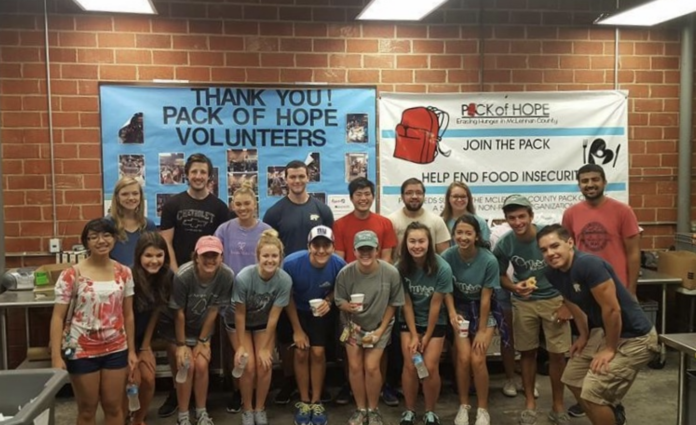
By Piper Rutherford | Staff Writer
Over weekends and holiday breaks, Pack of Hope provides food to 420 food-insecure Waco ISD students from kindergarten through eighth grade.
Sue Hanson, vice president of Pack of Hope, said the organization has served 912 bags of food this semester.
“These bags are a part of our Backpack Initiative,” Hanson said. “These bags include eight different items, such as two proteins — like Chef Boyardee meatballs — mac and cheese, a fruit cup, pudding cup, granola bar, Nutri-Grain bar, cereal, Pop-Tarts, fruit snacks, a cookie and two different kinds of juices.”
While it is a lot of work to get these bags made and delivered each week, Hanson said the organization appreciates the help of its volunteers, many of whom are Baylor students.
“We usually have pre-med students from Baylor — a part of the Baylor Medical Student Association or the American Medical Women’s Association, as well as athletes, such as the football team and golf team — who help us pack the food,” Hanson said.
For those looking to get involved with Pack of Hope, Hanson said the organization welcomes volunteers from 5:30 to 7 p.m. every Tuesday and from 7 to 8:30 a.m. every Wednesday at Columbus Avenue Baptist Church.
“There are 66 hours from the time these students leave school on Friday afternoon until the time they are back in class on Monday morning,” Hanson said. “At the end of the day, I hope we are helping these children, who should not have to worry about when or what they will eat next.”
As for how much each individual bag costs, Matt Helton, financial adviser for Pack of Hope, said the supplies are roughly $8.
“The money to fund these packs is possible because of the Texas Academic Performance Report, which breaks down the demographics of each school and the total number of disadvantaged students who need food,” Helton said. “So, based on the pack counts and how much we are expected to distribute in total that school year, the state will give a certain amount of money to each school district to spend on resources like ours.”
Even with these state funds, Helton said the organization still combats rising food prices, which force it to reduce the number of pack counts unless donations supply the difference.
“This past April of 2023, we were fortunate enough to receive Cargill’s $50,000 grant, which allowed us to serve more children instead of decreasing the amount of children we serve,” Helton said. “In addition to this, we send out an annual letter asking for donations in the months of August and September each year to a list of previous donors — in which last year we received an average of about $18,000 per month, while this year, taking into account Cargill’s donation, we have received an average of $22,000 per month.”





